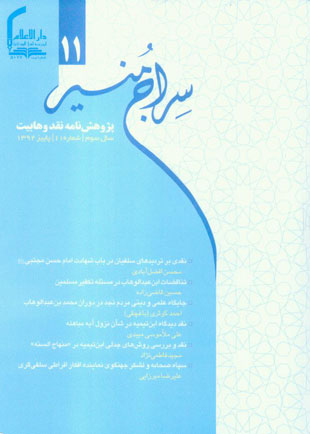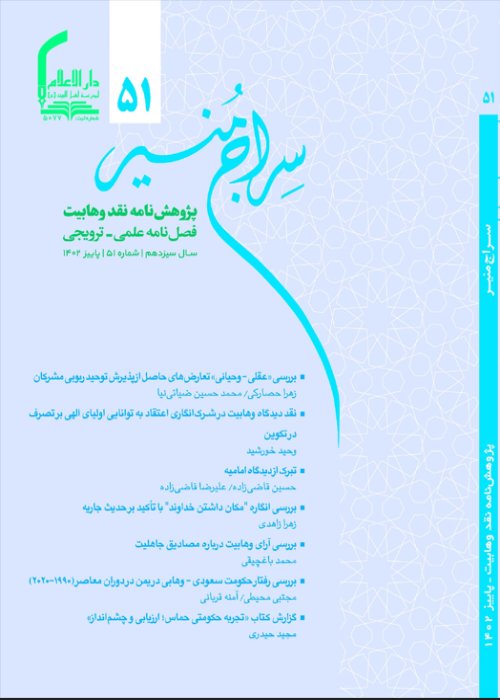فهرست مطالب

نشریه سراج منیر
سال سوم شماره 11 (پاییز 1392)
- تاریخ انتشار: 1392/10/01
- تعداد عناوین: 10
- سرمقاله
- گفت و گو
-
افترائات وھابیت علیه شیعه / در مصاحبه با حجت الاسلام و المسلمین توحیدیصفحه 11
- مقالات
- گزارش ها
-
سلسله گزارش ھایی از آثار اھ لسنت در نقد افکار وھابیت (8) / گزارش کتاب «الصارم المسلول علی من انکر التسمیه بعبد النبی و عبدالرسول»صفحه 203
-
Page 39Among all Muslims, Imam Hassan Mujtaba (pbuh) is regarded as the examples of the Verse of Purity (Ayat Al- Tathir) and the Members of the House of the Prophet. During his life, he faced many difficulties that one of these problems was Muawiyah who was against him. After martyrdom of Imam Ali (pbuh), Muawiyah considered Imam Hassan (pbuh) as a major obstacle in the way of his plans, and sought to eliminate him, in order to smooth the succession of his son until he murdered Imam Hassan (pbuh). The martyrdom of Imam Hassan (pbuh) by Muawiyah’s prepared poison is one of the much discussed cases of Sunni scholars and they have frequently quoted this story. But some of them denied this true story and raised doubts, in order to acquit the Muawiyah of the crime. In this article we review them.Keywords: Salafis, Muawiyah, Imam Hassan (pbuh), Jadah
-
Page 63Ibn 'Abd Al-Wahhab adduced a reasons for Muslims excommunication (Takfir), in this article we first list his reasons and then we express the contradictions in themand finally we prove that these reasons, despite the human and financial costs for Islam has serious problems namely contradiction. These contradictions will be proved with 3 titles: 1. Follower (Muqallid) or religious authority (Mujtahid) 2. Religious permit to implore to a creature in what it has ability in (jawaz istighatha bi-makhlugh fima yaghder alaih) 3. Consensus Takfir (Excommunication) or Ijtehadi. The contradiction does not mean that he said a word in one place and said the opposite of that word in another place, but these contradictions are mainly in Ibn 'Abd Al-Wahhab’s opinions.Keywords: Ibn Abd Al Wahhab, Divine Unity (Tawhid Oluhi), Worship, Implore (Istighatha), polytheism (Shirk), Excommunication (Takfir)
-
Page 93By the help of Muhammad bin Saud, Muhammad ibn 'Abd Al-Wahhab founded the Wahhabi movement in Najd Arabia. Making takfir upon Muslim he prepared the ground for bin Saud to murder, plunder and war against Muslims in Najd. Following and justifying the belligerent actions Muhammad ibn 'Abd Al-Wahhab, his advocates believed that the people of Najd at that period of time are Pagan (mushrik) and ignorant. On the other side, the opponents of ibn 'Abd Al-Wahhab places this idea a basis to legitimize murder and plunders happened by the hand of Wahhabis, and with their evidence we understand that verdict of disbelief and ignorance was a means to achieve to the political and social power and a pretext for taking revenge of the people whom did not accept his innovations (Bid’a).In this article, we review the scientific conditions of Muhammad ibn abd al-wahhab from the perspective of advocates and opponents.Keywords: Muhammad ibn Abd Al Wahhab, Najd, polytheism (shirk)
-
Page 121This article expresses and criticizes the opinions of Ibn Taymiyyah about revelation of the verse of Mubahila. Ibn taymiyyah in his minhaj al-sunna has criticized the Mubahila verse as one of the characteristics of Imam Ali (pbuh). He admits that this verse reveals the dignity of ahl al-bayt and that ahl al-bayt confined to Ali, Fatima, Hassan and Husain and so he considered their presence in Mubahila as a virtue for them, However, he believes that the Prophet has no need to ahl al-bayt’s prays for Mubahila and presence of Imam Ali is not regarded as characteristics for him; because the word “nafs (myself)” in the verse does not imply equality and term “abna’na wa nisa’na wa anfosana” in this verse is a general term that could also include the others (non-Household), since there was no nobody other than them for Mubahila at that time. This article considers the claims of Ibn Taymiyya as baseless and wrong by quoting traditions and the words of some Sunni scholars, and considers this verse as a potent reason for the virtue of Imam Ali (pbuh).Keywords: Mubahila, Imam Ali's Caliphate, virtues of ahl al bayt, ibn taymiyyah, minhaj al sunna
-
Page 143This article is about the polemical methods of Ibn Taymiyyah Harrani in Minhaj- us- Sunnah. From the perspective of many Sunni scholars, this book is one of the best texts in rejecting the beliefs of Shia Imami. For the better evolution of these remakes, it is essential to review the methods of Ibn Taymiyyah on argumentation first, So we can find out whether his methods in debate with Allameh Helli is according to the best controversy (jidal ahsan), which is approved by God, the sunnah of the Prophet (pbuh) and all Muslim scholars, or it was in invalidate method which is not approved by God nor the sunnah of the Prophet (pbuh). In order to learn more about the debate (jadal), at first a brief discussion will be made and then we review the words and tricks applied by ibn taymiyyah in response to Allameh Helli in this book and finally we conclude that he has not been seeking the best controversy (jidal ahsan) to achieve the truth or ideal result but only he has been looking for a rejection on the Allame’s book even in an invalidate manner. He did not adhere many aspects of the debate on the ethical and scientific dimensions and we couldn’t consider this book even as a scientific or ethical book.Keywords: Ibn Taymiyyah, Minhaj, us, Sunnah, Manhaj, salafiya, false reasoning (mughalita), debate (jadal)
-
Page 171In the 1990s concurrent to the primary years of Islamic Revolution in Iran, maulavi hagh-navaz Jhangvi founded the excommunication (Takfiri) group named Sipah-e- Sahaba from the religious schools in Pakistan which was belonging to Deobandi sect. Its purpose was to confront Shiites, mourning for Imam Hussain (pbuh), and influences of Islamic revolution and action to be psychological warfare, terror, Shiites physical removal and destruction of their religious places. With establishing a military wing named Lashkar-e-Jhangvi, this extremist group completed its organization for the specified path. Performance of these two extremist groups, which is along with each other, lead to divergence in the Muslim community of Pakistan, to intensify sectarianism, insecurity and their broad and unjustified killings. In the present article, along with studying the pedigree and the roots formation of this group, some part of their violent features has been discussed according to the facts and news.Keywords: Salafism, Extremism, Sipah, sahaba, Lashkare, Jhangvi, Deobandi, Pakistan


